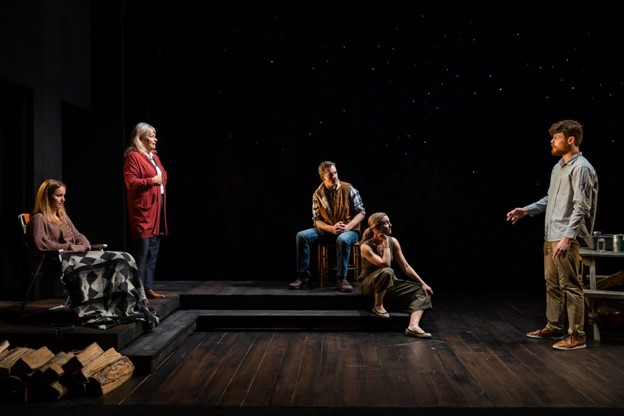
Heroes of the Fourth Turning – Written by Will Arbery; Directed by Marianna Bassham; Set Design by Baron E. Pugh; Costume Design by Rachel Padula Shufelt; Sound Design by Elizabeth Cahill; Lighting Design by Jeff Adelberg. Presented by Speakeasy Stage at the Roberts Studio Theatre, Calderwood Pavilion, Boston Center for the Arts, 527 Tremont St. Boston through October 8
by Mike Hoban
There’s a lot to unpack in playwright Will Arbery’s Heroes of the Fourth Turning, the thought-provoking political drama now running at Speakeasy Stage. Brilliantly acted by a terrific ensemble, Heroes is billed as a look at “a country at war with itself,” but in truth delves more specifically into the internal divides within the Catholic wing of the Republican party brought on by the election of Donald Trump. Interestingly, the play is set in 2017, two days before the solar eclipse and just one week after the white nationalist riots in Charlottesville – which means that the play pre-dates the 2020 election and the ensuing insurrection at the Capital that led the Republican party to desert their conservative principles in deference to the Big Lie pushed by the former president.
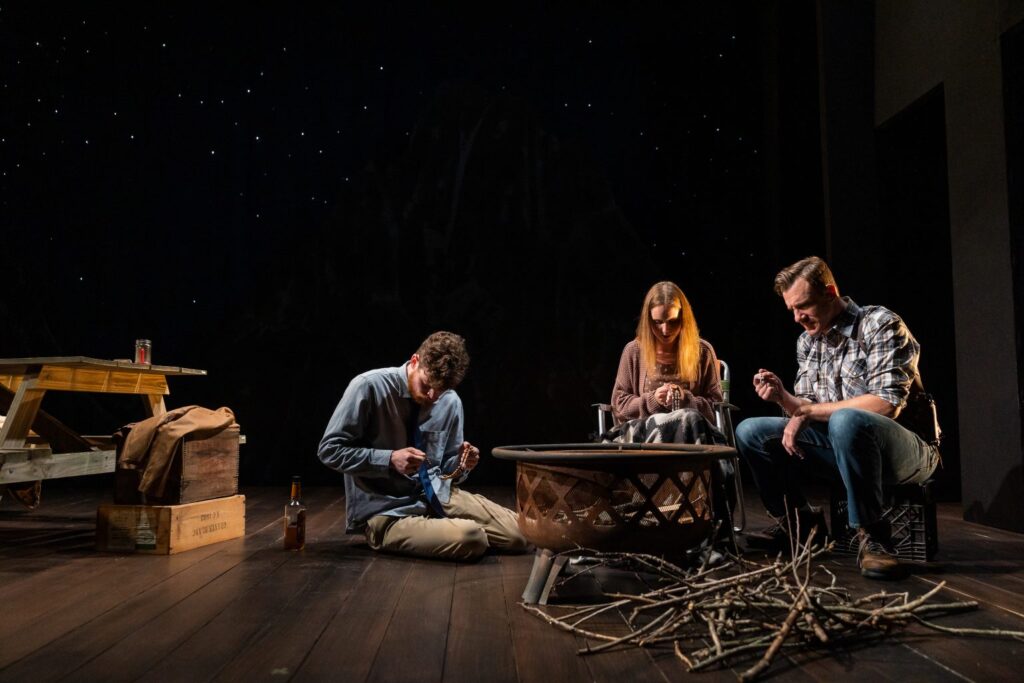
Heroes centers on four friends, three of whom are graduates of the Transfiguration College of Wyoming, an ultra-conservative Catholic university that one of the characters describes as a place where, “you got wilderness training, you spoke conversational Latin, locked your phone in a safe for four years and rode horses and built igloos and memorized poems while scaling mountains.” The grads, who took diverse paths in life, have returned seven years later, and are joined by friend Emily, the daughter of the newly appointed president of the university, Gina (Karen MacDonald), whom they have come to join with in celebration.
The play takes place just outside of a reception hall on the campus, in a woodsy setting complete with a picnic table and fire pit. There’s Justin (Jesse Hinson), the military veteran who entered the college later in life and seems to have embraced the outdoors/survivalist life after some secular experimentation; Theresa (Dayna Cousins), the toxic conservative social media star who numbers Steve Bannon among her personal influencers; the emotionally erratic Kevin (Nathan Malin), whose whiskey bottle is like an appendage as he stumbles around hoping to have “a Big Conversation” about matters of faith; and Emily (Elise Piliponis), the youngest and seemingly the most spiritual of the bunch, despite being crippled with pain from what appears to be rheumatoid arthritis, debilitated to the point where she needs to be carried at times.
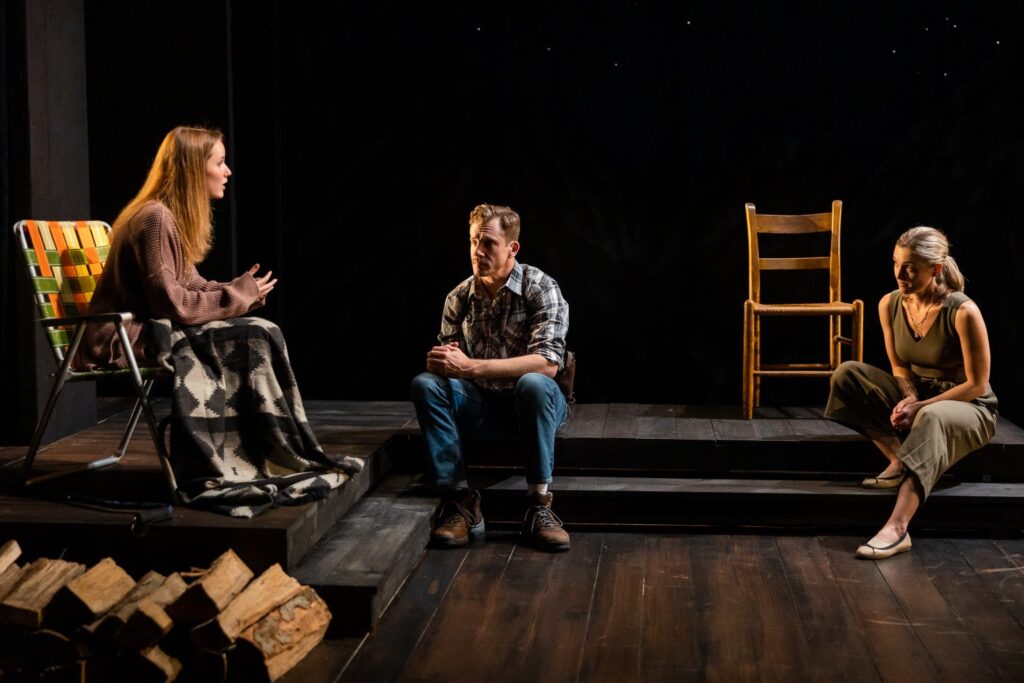
What follows is two hours (with no intermission) of nearly nonstop conversation among the protagonists, all of whom are unwaveringly tethered to their deeply held Catholic beliefs. The ascent of Trump has shaken their ideas of what it means to be a “conservative” as many of the stances of the evolving Republican party are in direct opposition to the principles of their faith. The strain is beginning to show for all of the friends, save for the amoral Theresa, who weaponizes her religion and could be the poster girl for rationalization as she pushes her Stalin-esque “ends justify the means” dogma.
Playwright Will Arbery has given us well-drawn, thoughtful characters whose internal struggles are palpable, instead of evil cardboard cutouts designed to appeal to audiences that tend to be more progressive. And Arbery and director Marianna Bassham are aided greatly by a skilled group of actors who thoroughly embrace those struggles. Justin, a decade or more older than his friends, is clearly torn by the divide between his faith and reality, beautifully exemplified by his repeated scrubbing of a (real or imagined) blood stain from a deer he shot at the opening of the play that just won’t come out, a la Lady MacBeth, and Hinson’s performance is subtle and moving. Nathan Malin delivers yet another stellar turn as the drunken, emotional train wreck Kevin, a presumed incel (involuntarily celibate), who in between vomiting and declaring his love for both women friends, spews self-loathing that extends far beyond his drinking, “I think there’s a demon in me. I’ve been so evil lately,” he tells Theresa. “Something needs to change in me…I’m the worst. I’m the worst. I’m the worst.”
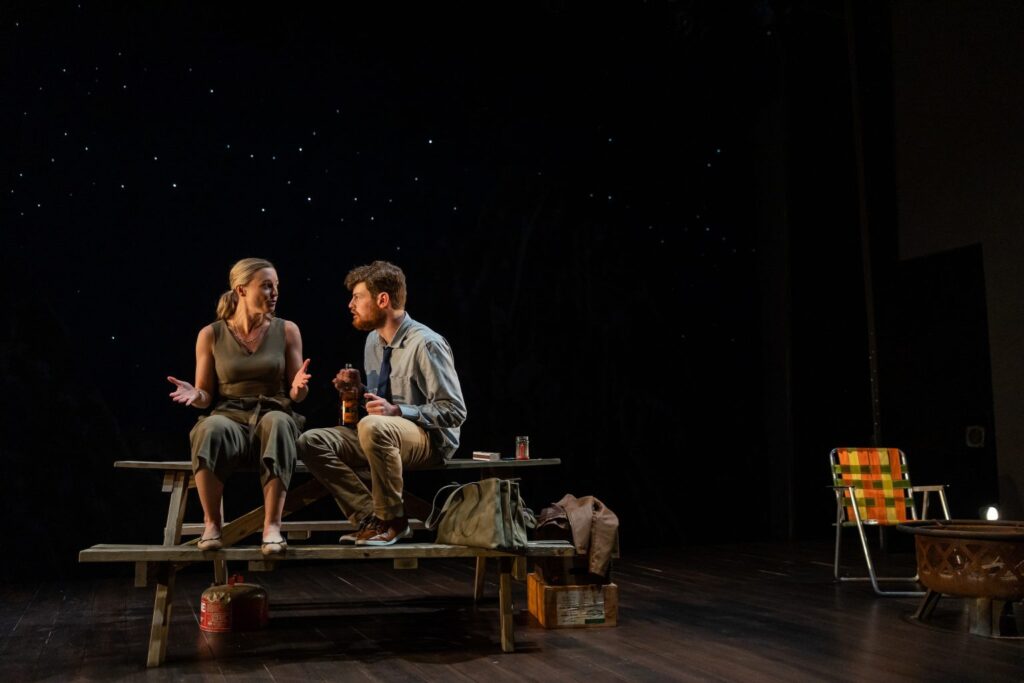
From her perfect posture to her impeccable dress, Cousins is the embodiment of the Connecticut WASP, but deftly injects her characterization with the type of borderline personality disorder that one might find in South Dakota governor Kristi Noem. Completely lacking in empathy for anyone who does not live up to her standards or shares her warped belief system, she represents the worst of the highly educated wing of the conservatives, describing the opposition as “a throbbing mass of genderless narcissists….Everyone working for any business or public school will be frog-marched through diversity and inclusion training. It won’t just be about tolerating, which we do, it will be about affirming their disorder. Which is a sin.” Wow.
As the sweet Emily, Piliponis is wonderfully appealing as the only character who seems to have any real God consciousness despite her affliction, admitting to her friends that, despite her belief that “abortion is murder,” she still believes her friend who works at Planned Parenthood is a “good person,” and it seems heartfelt. And MacDonald, who plays Gina, is convincing as the incoming president who appears to be the voice of reason until her stated opinions take demented turns.
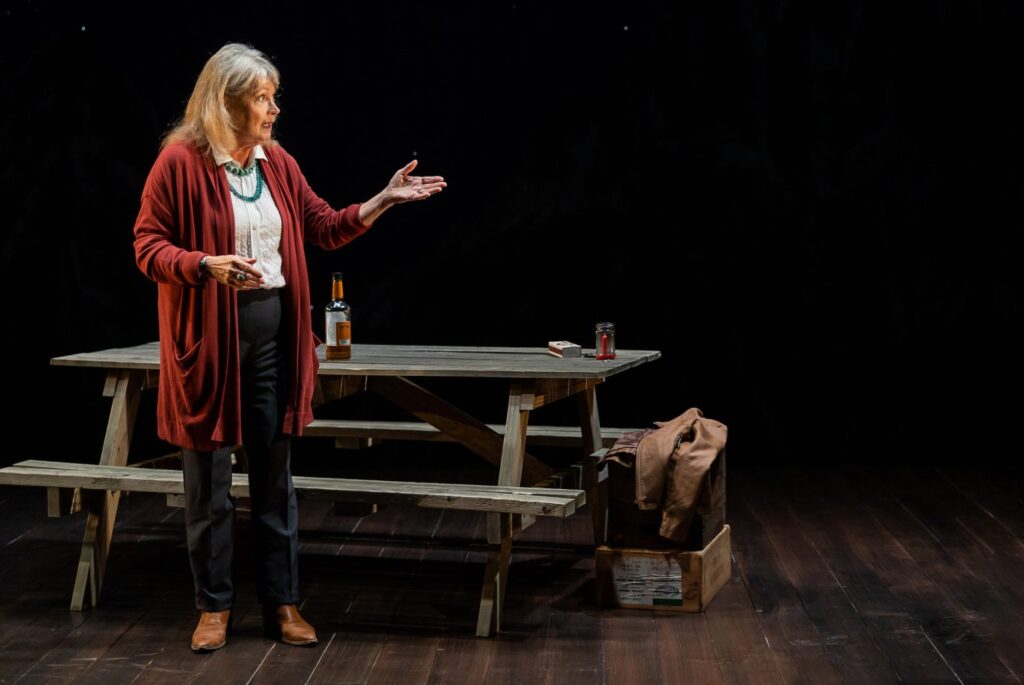
This may be the most thought-provoking piece I’ve seen in years, made more so because the character’s values are so different from my own. The real effect of seeing this play will have many identifying with the players, not for their “conservative” beliefs, but for how they wrestle with their own conscience in order to be in solidarity with those who share their basic values. The danger lies when we’re not being mindful of sliding into unquestioning groupthink. And while it is easy to point fingers at the right wingers for their extreme views (with good reason), perhaps those of us on the other side need to come to grips with some of the extreme positions that are becoming more pervasive in academia and other institutions, including the arts community. We currently live in a society where dissent from the party line – no matter how much an endorsed idea flies in the face of reality – is not tolerated, and the “If you ain’t with us, you’re agin us” mentality is squelching honest public discourse. This production is sure to generate a lot of post-performance discussion and should be seen by all theater lovers – regardless of their politics. For tickets and information, go to: https://www.speakeasystage.com/

